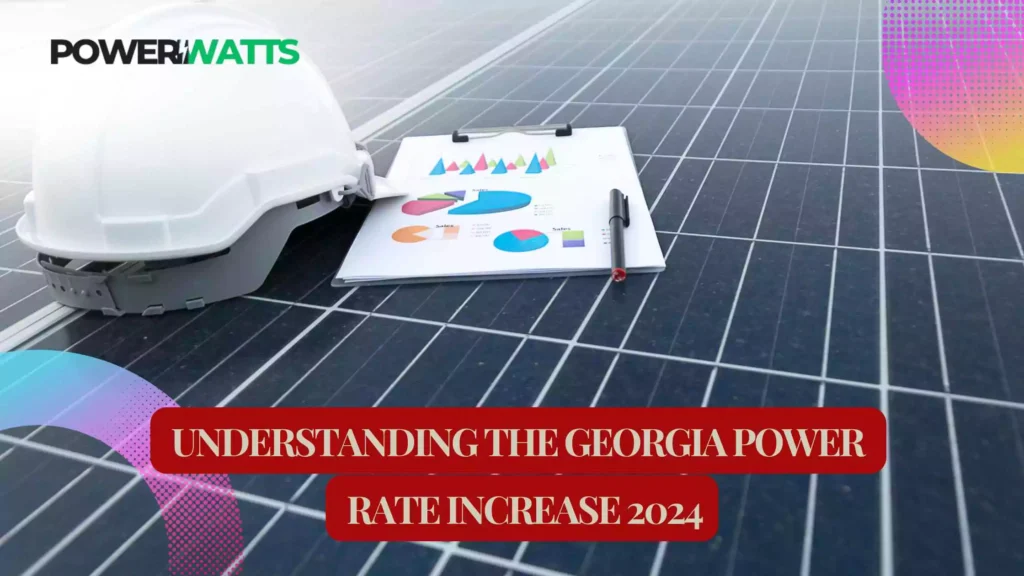The Georgia Power Rate Increase 2024 is an important issue that impacts many individuals and companies throughout the state. With growing energy bills, customers must understand the causes behind the rise. This article will go over the reasons for the rate increase of Georgia’s power rate increase in 2024, the consequences, and what you can do to properly control your energy expenditures. Furthermore, we will look at the advantages of going solar in Georgia, which is a practical option for many households.
Overview Of the Rate Increase
Key Factors Driving The Rate Increase
1. Nuclear Power Expansion
The development of Plant Vogtle Units 3 and 4 has been plagued by delays and price overruns, imposing significant financial pressures on Georgia Power Rate Increase 2024. The entire cost of this project has risen to almost $30 billion, with consumers expecting to bear a large share of the costs via higher rates. The PSC accepted these increases as required to finance continuing operations and development.
2. Rising Fuel Costs
Fuel prices have varied substantially in recent years, affecting Georgia Power’s operations expenses. In May 2023, the utility expected a $4.5 billion shortfall, mostly due to higher fuel costs. The PSC’s approval of a 12% rate rise was expected to raise around $6.6 billion to offset these losses. As gasoline costs continue to climb, more hikes may be required.
3. Regulatory Decisions
The PSC plays an important role in authorizing rate hikes, often siding with Georgia Power’s proposals with little opposition. This tendency has caused many customers to believe that their interests are not sufficiently represented. The commission’s rulings mirror wider trends in energy policy and regulation, which favor utility profitability above consumer safety.
Implications For Customers
1. Increased Monthly Bills
As rates rise, customers may anticipate their monthly power expenses to skyrocket. For example, some consumers have complained that prices have risen from $0.15 per kWh to $0.21 per kWh, imposing a significant financial strain on homes and companies alike.
2. Effect oOn Lower-Income Households
The rate increases disproportionately impact low-income households, who may struggle to cover larger expenditures. As fixed expenses rise, these families’ budgets become less flexible, making it critical for policymakers to develop fair alternatives.
3. Long-Term Financial Planning
For many people, recognizing the long-term consequences of these rate hikes is critical for financial planning. With rates projected to rise further, customers should adopt smart energy management measures.
Benefits Of Going Solar In Georgia:
1. Abundant Sunshine
Georgia has an average of 218 bright days each year, making it a prime site for solar energy generation. This ample sunshine leads to increased efficiency and savings over time.
2. Significant Cost Savings
Investing in solar panels might result in significant savings on power expenses. Homeowners may save an average of $32,443 over the life of their solar system by lowering dependency on conventional utility services.
3. Energy Independence
Solar energy enables homes to generate their own power, minimizing their reliance on the grid and guarding against changing energy costs. This independence is especially important as utility costs continue to climb.
4. Environmental Impact
Switching to solar lowers your carbon footprint and dependency on fossil fuels, favorably contributing to environmental sustainability initiatives. Using renewable energy helps prevent climate change and promotes cleaner air.
5. Increased Home Value
Homes fitted with solar panels often experience a boost in property values. Potential buyers are increasingly interested in houses with renewable energy solutions owing to decreased utility bills and environmental concerns.
6. Federal Tax Incentives
The Residential Clean Energy Credit program allows homeowners to receive federal tax credits that may lower the initial cost of solar systems by up to 30%. This financial incentive increases solar’s accessibility and attractiveness.
Strategies To Manage Energy Costs
1. Conduct An Energy Audit
An energy audit might help you find places where you can cut down and save money. By measuring your home’s energy use, you may make improvements that may result in energy savings of 20-25%.
2. Invest In Energy Efficiency
Upgrading appliances and boosting insulation might result in substantial savings over time. Energy-efficient appliances use less power and may help offset some of the expenses associated with increasing rates.
3. Investigate Alternative Energy Sources
Consider investing in solar panels or other forms of sustainable energy. While the initial investment may be costly, solar power may result in long-term savings by lowering dependency on Georgia Power’s grid and locking in cheaper energy bills over time.
4. Stay Informed About Rate Changes
Keeping up with any new updates impacting Georgia Power’s pricing is critical. Engage with local advocacy organisations or attend PSC meetings to express your concerns and remain updated about prospective changes that may affect your bills.
Community Engagement And Advocacy
1. Participate In Public Hearings
The Georgia PSC invites public testimony at rate-change hearings. Engaging in these talks allows customers to convey their concerns directly to decision-makers.
2. Collaborate With Advocacy Groups
Joining up with local energy advocacy organisations may help you raise your voice against utility practices and regulations that harm customers.
Conclusion
The 2024 Georgia Power rate rise marked a major change in how people would pay for power. Consumers may better handle this hard situation by comprehending these increases and employing expense control methods.
Now is the time to investigate solar energy or efficiency enhancements to save expenses. Knowing these dynamics will enable you as a customer to make educated energy consumption choices despite escalating expenses and consider adopting solar in Georgia for long-term savings and sustainability.


